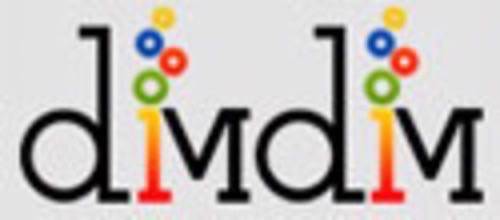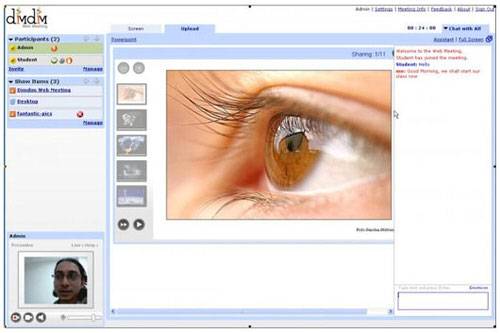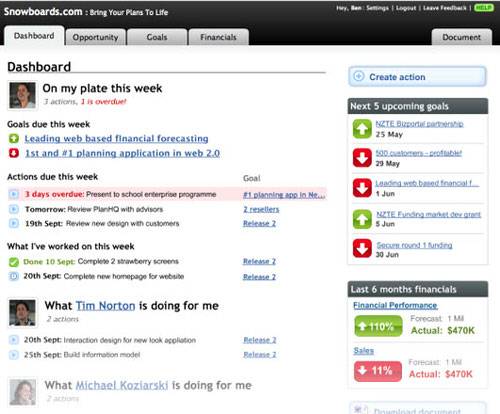The DEMOfall 2007 conference will be taking place in San Diego, CA this week, so Marshall Kirkpatrick and I decided to look through the list of companies and highlight the ones that we are most excited about seeing. There are almost 70 companies presenting at DEMOfall this year and information is sparse for many of them. Below is a preview of the companies we think will be highlights of the conference. (Presented in no particular order, links to companies in their logo.)

Let us know which companies you are most looking forward to seeing present and what you think of our picks in the comments below.

Marshall: Dimdim is an open source web conferencing application that I profiled for TechCrunch last year when the company released its alpha version. Cross platform performance is always my first test, and if it works, then this could be awesome.
Josh: I’ve had my eye on Dimdim since Marshall’s preview last year. Anyone who has ever attended a webinar using WebEx knows that the experience could be improved upon (WebEx isn’t bad, but there is certainly room for improvement). Dimdim’s site currently says the software can support “seminars with hundreds of attendees.” I hope it can scale higher — I can’t wait for the day when I can virtually attend all the great conferences around the world that I can’t always get to physically.


Marshall: A recommendation engine that’s raised $10m, which we profiled here. Potentially similar startups launching at DEMO include Your Truman Show, a cross-social-network media recommendation widget, and mSpoke‘s FeedHub, an RSS suggestion tool. Recommendation engines always catch my eye.

Josh: Diigo is a web-based tool for what the company is calling “social annotation.” It lets users highlight, annotate (via sticky notes), and clip information from any web site. What I think makes Diigo potentially very useful is that you can share your annotations, clippings and bookmarks with a group. For students and professors I think Diigo could help groups organize their thoughts and research for team projects. Marshall reviewed them a year ago for TechCrunch.
Marshall: I like Diigo a lot, but I haven’t kept using them in the time since I first reviewed them. The new Webslides feature looks like it could come in handy and the groups looks solid, if basic, but I don’t know how many more features this product needs. There are already so many! I think they need to focus on finding distribution
channels for what they’ve already built.

Josh: Earthmine is creating a competitor to Google’s Street View maps. Rather than using video, Earthmine will use “laser range-finding and still photography” (via Webware), which will result in perspective-correct photos that are more detailed and complete. Earthmine claims they can capture entire towns in just weeks using their camera set up, and they plan to extrapolate 3D data from the photos. It also looks like they plan to tag real-world objects within 3D panoramas to give their “geospatial inventories” context.
Marshall: This looks like nothing but ‘wow’ – not truly useful. Even people interested in espionage are likely to do their street-level reconnaissance in person if at all possible. Give me a view from the sky and a set of directions to get somewhere and I’m more than happy.

Marshall: MetaRader is a media feed viewing platform. Making media feeds easy to view, with chat and other forms of communication, is something many people are working on doing. MetaRadar has a beautiful interface that could make a strong showing.
Josh: I don’t see sharing media I find online with my friends as currently being all that difficult, so for me the usefulness of this software will hinge on whether it can make it easier to find things of value to me. It is beautiful, though. When I first loaded up their site I thought they were making a hardware MP3 player (and a very pretty one, at that).

Josh: MotionDSP makes software that cleans up low quality video. Generally useful for cell phone videos, it corrects lighting and clarity to greatly increase the ‘watchability’ of poorly compressed video. The demos on their site are impressive, especially the book demos, which clean up a very pixelated image of books on a shelf to make the titles on the book spines readable. With the prevalence of cell phone cameras, I could see this software being useful. I would think it also likely has law enforcement applications.
Marshall: At DEMO MotionDSP will be launching a new consumer-facing site called FixMyMovie, where anyone can use their service. They are funded by and do work for the CIA, so watch out!


Josh: Fluid Innovation helps large companies like Microsoft and Lockheed Martin license in-house developed software to other companies, and at DEMOfall they’ll be unveiling their new Virtual Ventures service. Virtual Ventures has been described as a fantasy venture capital game to help companies gauge interest in real world ideas. This reminds me of Spigit, which is also presenting at DEMOfall this week.
Marshall: It looks like this company already has big customers. I’ll be curious to see what exactly they show at DEMO. I like services and if this one has been proven already then I’m tempted to keep my skepticism to myself. I wonder, though, whether innovation is truly too fluid for even Fluid Innovation to turn into a part of the regular supply chain.

Marshall: Shoutlet is a front end for widget and feed publishing and management for marketers. Apparently general consensus is that marketers aren’t as smart as other people and need dumbed-down tools to perform basic web 2.0 activities. If that’s true, and it may well be, Shoutlet could be perfect. It was built by marketers themselves, or at least they hired someone to build it.
Josh: Shoutlet is certainly a pretty package, and all-in-one tools can make things a lot easier. But they have to hit a home run on all fronts to win converts, in my opinion. When you already have great tools for widget creation, podcasting, RSS metrics, content management, etc. it’s hard to make an argument to switch to inferior tools just for the sake of convenience. I’ll reserve judgment until I see Shoutlet in the flesh, so to speak.

Josh: PlanHQ is a business plan creation tool and keeps on top of milestones that you’ve set for your business. Though some VCs don’t think business plans are necessary anymore, I think PlanHQ can be a helpful way to visualize where you want your business to go and to keep on top of your goals. Even if you’re not using it to create a formal plan, figuring out your goals and keeping track of them can be helpful.
Marshall: Maybe, if you’re in a sector that still requires business plans… I’m sure this kind of thing could be helpful to anyone.


Marshall: Yuuguu is a cross-platform screensharing and remote desktop control tool with IM and voice. Sounds great, but we couldn’t get it to work.
Josh: Last month when I wrote about Kyte, I got a demo from the company’s CEO, Daniel Graf, and he used Glance so that I could watch his desktop in real-time while we chatted on the phone. It was neat, but I think it has fairly limited applications (training, demos, presentations).Yuuguu seems to be promoting itself as a consumer product, which I don’t really see it as.

Marshall: Patients fill out info electronically in doctors’ waiting rooms while viewing ads on a digital clipboard. Their pitch is that it makes checking in at the doctor’s office quicker and easier. I find this interesting but wonder about the influence of medical ads in the waiting room. I’m probably being very naive about that.
Josh: I’m not really up on this idea. I don’t think I’d trust some device that is showing me ads with my medical information and wouldn’t really be happy if my doctor asked me to use this instead of a pen and paper. I think privacy issues might be too big to overcome for anything that tries to monetize your personal medical history. Digitizing the check in process at the doctor is a good idea, providing relevant medical info to patients is a good idea, mixing personal medical information with commerce is a bad idea.

Marshall: Livemocha is a language learning social network with heavy hitting investors. Livemocha says that 95 million people immigrated to other countries in 2000 and that number is set to explode over the next 10-15 years. That’s their market. Internationalizing the web is hot, so Livemocha could make a splash. (Disclosure: Marshall is currently consulting for a pre-launched competitor in this sector).

Marshall:Qumranet summarizes themselves succinctly on their website when they say the company “is the proud sponsor, maintainer and catalyst behind the Kernel-based Virtual Machine (KVM) project, a global open source effort focused on integrating robust virtualization capabilities into the Linux kernel. The KVM virtualization solution has been officially included in Linux 2.6.20.”
This virtualization project is backed by Sequoia, who funded Google and YouTube, and they seem to be seeing some important early success. I’d say betting on them would be smart.

















